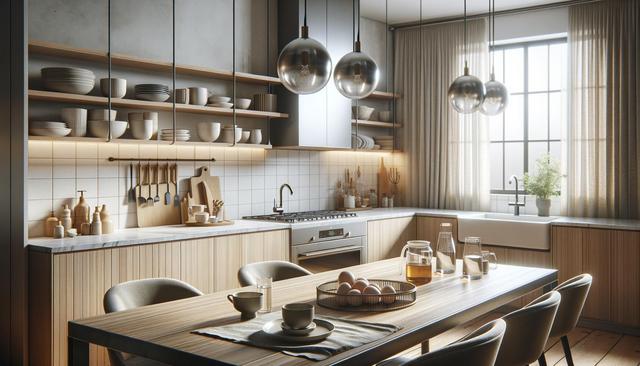Natural Stone Surfaces: Beauty and Strength Combined
Natural stone countertops are often a favorite choice among homeowners due to their timeless appearance and remarkable durability. These surfaces, which include granite, marble, and soapstone, offer a unique aesthetic since each slab features distinct patterns and color variations. Granite, in particular, is well-known for its ability to resist scratches and heat, making it a reliable option for those who cook frequently. Marble, while slightly softer, adds a touch of elegance with its smooth, veined texture.
For those considering natural stone, it’s important to weigh both the visual appeal and maintenance requirements. Regular sealing may be necessary to prevent staining, especially with marble. However, with the right care, these countertops can maintain their charm for decades. Some of the notable benefits of natural stone include:
- Highly durable and long-lasting
- Heat and scratch resistant (especially granite)
- Each piece is unique in appearance
Natural stone fits well in a variety of kitchen styles, from rustic and traditional to modern and minimalist. It’s a top-tier choice for those seeking a blend of function and natural elegance.
Engineered Stone: Consistent, Sleek, and Low-Maintenance
Engineered stone, often made from quartz and resin blends, offers a sleek and uniform look that appeals to many modern kitchen designs. Unlike natural stone, quartz countertops are non-porous, which makes them resistant to stains, bacteria, and moisture. This property makes them especially practical for busy households or kitchens where daily cooking is a norm.
One of the advantages of engineered stone is the vast range of colors and patterns available, many of which mimic natural stone. It’s also one of the easier surfaces to maintain, requiring only basic cleaning with mild soap and water. While quartz is not as heat resistant as granite, it is less prone to chipping and cracking.
- Non-porous and hygienic
- Wide variety of color options
- Minimal maintenance required
Engineered stone is a smart option for those looking for an attractive, consistent, and functional surface that fits into contemporary kitchens with ease.
Wood Countertops: Warmth and Character for Your Kitchen
Wood countertops bring a natural, warm feel to any kitchen, making the space more inviting and cozy. Popular wood types include maple, walnut, and oak, each offering its own grain patterns and tones. These surfaces are ideal for those who enjoy a rustic or farmhouse style, but they also integrate well with transitional and eclectic designs.
One of the key benefits of wooden countertops is their ability to be refinished over time. Scratches, stains, and minor damages can often be sanded down and resealed, extending the life of the surface. While wood is more susceptible to moisture and heat damage than stone, proper sealing and regular maintenance can help mitigate these risks.
- Renewable surface—can be sanded and refinished
- Warm aesthetic that softens modern kitchens
- Good for use in specific zones like islands or baking stations
A wood countertop is ideal for homeowners who appreciate craftsmanship and are willing to invest a bit of time in upkeep to enjoy its natural charm and tactile appeal.
Concrete Countertops: Customizable and Contemporary
Concrete countertops have gained popularity in recent years for their industrial look and high level of customization. These surfaces can be cast in virtually any shape, size, or color, offering a bespoke solution for homeowners with specific design visions. Integrating pigments, aggregates, or even inlays like glass or metal can produce a truly one-of-a-kind countertop.
Despite its toughness, concrete can be prone to hairline cracks and stains if not properly sealed. However, modern sealants and additives have improved its resilience, making it a more viable option for everyday kitchen use. Concrete’s weight also requires sturdy cabinetry and professional installation, which may add to the overall cost.
- Customizable in shape and finish
- Strong and durable when sealed properly
- Provides a unique, industrial aesthetic
Concrete countertops suit homeowners seeking a bold, modern design and who value customization and uniqueness in their kitchen space.
Laminate Countertops: Budget-Friendly and Versatile
Laminate countertops remain a popular option for budget-conscious remodels or rental properties. Made from layers of plastic bonded to particleboard, laminate has come a long way in terms of design and durability. Modern laminate can mimic the look of wood, stone, or even metal at a fraction of the cost.
While not as heat or scratch resistant as other materials, laminate is lightweight, easy to install, and available in a wide range of colors and patterns. It’s also a good option for those who like to update their kitchen décor frequently, as replacing laminate is relatively simple and cost-effective.
- One of the most affordable countertop materials
- Wide variety of styles and colors
- Easy to clean and maintain
Laminate countertops work well in casual kitchens, apartments, or secondary prep areas. They offer a flexible solution for those looking to balance aesthetics with affordability.
Conclusion: Matching Your Countertop to Your Lifestyle
Choosing a kitchen countertop is more than just a design decision—it’s about finding the right surface that fits your cooking habits, style preferences, and maintenance expectations. From the solid presence of granite to the warmth of wood and the modern appeal of quartz, there’s a wide range of options tailored to various needs and budgets.
Whether you’re renovating a kitchen from scratch or simply upgrading an existing space, taking the time to understand the pros and cons of each material helps ensure a choice that adds long-term value and enjoyment. Think about how you use your kitchen daily, and select a surface that supports both your routine and your personal taste. With thoughtful planning, your countertop can become both a functional work zone and a visual centerpiece of your home.


